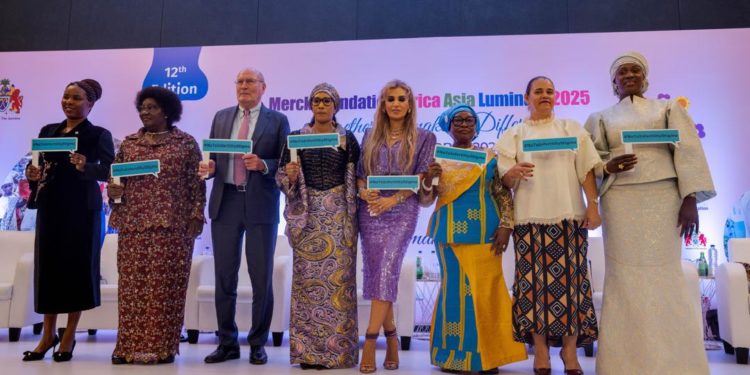By Kemo Cham
Merck Foundation is making history together with Africa’s First Ladies in developing the continent’s healthcare sector, Prof. Frank Stangenberg-Haverkamp, Chairman of Merck Foundation Board of Trustees, told First Ladies and delegates at the 12th Edition of Merck Foundation Africa Asia Luminary in Banjul.
The event held at the Sir Dawda Kairaba Jawara International Conference Centre in the Gambian capital on Tuesday, 14th October, brought together seven First Ladies, among over 6,00 delegates from more than 70 countries. It was also graced by the host country’s Vice President, Muhammed Jallow, siting in for President Adama Barrow.
Co-hosted by Gambia’s First Lady, Fatoumatta Bah-Barrow, in partnership with the Merck Foundation, the landmark two-day hybrid forum was convened on the theme: “Building Healthcare Capacity and Breaking Stigma Across Africa and Asia.” It focused on strengthening healthcare systems, promoting girls’ education, and addressing infertility stigma across Africa and Asia. Also part of the event were policymakers, health professionals, and development partners.
In his statement, Prof. Stangenberg-Haverkamp outlined the impact of Merck Foundation in the course of 13 years of its development progress in Africa, Asia and underserved communities, citing particularly scholarship opportunities that have seen many countries have their first specialist doctors in critical public health issues.
“For the past 13 years, all our programs have reflected our mission that is to build and advance healthcare capacity, transform the patient care landscape, break the stigma of infertility, empower women, and support girl education across the continent and beyond,” he said.
“Working closely with First Ladies, and other partners including Ministries of Health, Education, and Gender Affairs, Medical Societies, Media, and Art; respecting their sovereignty, providing sustainable solutions, and genuinely investing in people and their social and health development has made Merck Foundation one of the most trusted and respected Foundations in Africa. And we are truly proud of this,” he added.
Merck Foundation is a private, charitable organization which provides financial support for philanthropic initiatives tackling important global health and social needs. The Foundation is funded by E. Merck KG. One of its most impactful programs with remarkable tangible outcomes has been its scholarship program, through which it has committed to transforming the patient care landscape in the public health sector in countries it operates. The organization sees this as a vital catalyst for both economic growth and social development.
Through this initiative, hundreds of healthcare professionals have received training in specialist areas that were initially lacking on the continent of Africa, like oncology, cardiology and pulmonology.
According to Prof. Stangenberg-Haverkamp, the Foundation has provided over 2,400 scholarships in these areas.
“We believe that good healthcare can transform the lives of individuals and families across developing countries,” he said, adding: “It significantly contributes to the economic and social development of any country because healthcare is a major driver of both. Therefore, we are strongly committed to transforming patient care landscape through our scholarships program,” he said.
The Merck Foundation scholarships include one-year diploma and two-year master’s degree for healthcare providers. The beneficiaries of these come from some 52 countries, across 44 critical and underserved medical specialties.
In her opening remarks, First Lady Bah-Barrow of The Gambia hailed this achievement and praised the collaboration between her office and Merck Foundation for empowering health professionals through specialized training and ensuring they are better equipped to deliver quality care to those who need it most.
“I am proud of my partnership with Merck Foundation,” she said. “They have provided 94 scholarships for our local Gambian doctors in more than 30 critical and undeserved specialties. Together we are not only transforming our public healthcare landscape but also making history as many of these doctors are becoming first specialists in their fields.”
The Gambian First Lady urged unity among women leaders, stressing that health is not merely the absence of illness but the presence of opportunity for every individual to live a dignified life.
Representing President Adama Barrow, Vice President Jallow commended the Foundation for investing in the continent’s healthcare capacity, which he noted was a true contribution to the UN Sustainable Development Goals and the African Union Agenda 2063.
VP Jallow also reaffirmed Gambia’s commitment to advancing women’s empowerment through free education for girls and increased female participation in governance.
“Real progress begins when we care for the sick, educate the young, and empower the vulnerable,” the Vice President said. “Your joint efforts in improving healthcare in Africa through scholarships, professional training, and public awareness campaigns are remarkable.”
Dr. Rasha Kelej, CEO of Merck Foundation, hailed the host country for its display of hospitality, noting that the Foundation’s mission goes beyond training doctors to changing narratives and breaking stigma.
“Our work goes beyond medicine – it’s about transforming lives, building resilience, and giving every community the tools to thrive,” said Dr Kelej.
“Together with our partners and the First Ladies of Africa, we are transforming patient care and making history,” she stressed.
Also in attendance were First Ladies from Liberia, Senegal, Burundi, Cape Verde, the Central African Republic, and São Tomé and Príncipe.
The second day of the event featured three key parallel scientific and community awareness sessions, covering topics such as diabetes and hypertension, medical capacity building in other specialties like respiratory care, acute care, emergency pediatric and neonatal care, as well as a Health Media Training, which was designed for African journalists. The Foundation said this session emphasizes the critical role of the media in influencing communities and driving cultural change, with regards to a wide range of social and health issues like Breaking Infertility Stigma, Supporting Girls’ Education, Stopping GBV, Ending Child Marriage & FGM, Empowering Women, Diabetes and Hypertension Awareness.






















